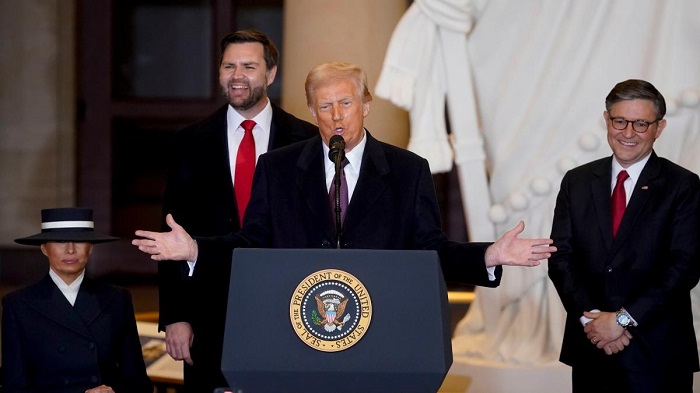Tariq Saeedi
Donald Trump, the 47th president of the United States, eloquently presented his vision of peace and leadership in his inaugural speech. This is the obverse (heads) side of the coin.
His flurry of executive orders signed the same day, shattering the record for the most executive orders signed by a US president on his first day in office, is the reverse (tails) side of the coin.
First, let’s look at the Trump’s vision of peace. — in doing so, we will keep in mind that 2025 is the year of peace and trust, as declared by the UN, in pursuance of a resolution tabled by Turkmenistan and co-sponsored by 86 countries.
We are also mindful that there are a number of current and emerging conflict situation around the world where peace is urgently required.
President Trump said in his speech, “We will measure our success not only by the battles we win but also by the wars that we end. And, perhaps most importantly, the wars we never get into. My proudest legacy will be that of a peacemaker and unifier. That’s what I want to be. A peacemaker and a unifier.”
There are three separate elements to this vision:
- The battles we win
- The wars we end
- The wars we never get into
In the same paragraph, Trump describes how he would like to be remembered: “My proudest legacy will be that of a peacemaker and unifier. That’s what I want to be. A peacemaker and a unifier.”
Let’s rephrase this from a third-person perspective: President Trump, who would like to be remembered as a peacemaker and unifier, would measure his success in terms of wars he can end and, more importantly, the wars he never gets into.
This is the most laudable ambition considering that the USA has the ability and resources to help end almost all of the war-situations in the world today and prevent any conflict-situations from flaring into new wars.
The logical path toward this noble goal would be to turn off the spigot, to shut down the material and political resources that could be feeding a war. However, for this approach to be successful, it would be necessary for all the stakeholders in a war to act in unison, with unity of intention. — This can only be done if the human tragedy is recognized as the price of a war – the number of dead and injured, the children orphaned, the families left without a breadwinner, the communities displaced, the infrastructure smashed, and the economic setbacks leading to poverty and hunger.
Trump is an outsider and has managed to return to the White House despite all the barriers and hurdles created by his opponents and the establishment. We have great respect for him.
We believe the word of Trump and already recognize him as a peacemaker and unifier unless he proves otherwise during his four years in office. /// nCa, 23 January 2025 [to be continued]
